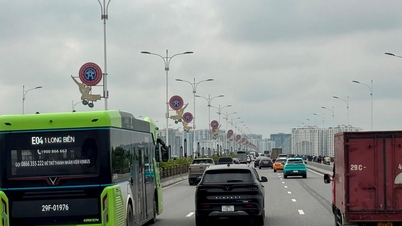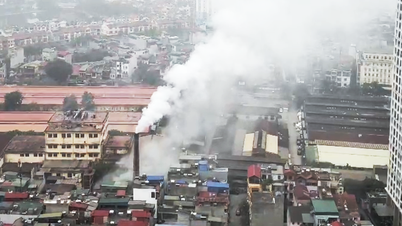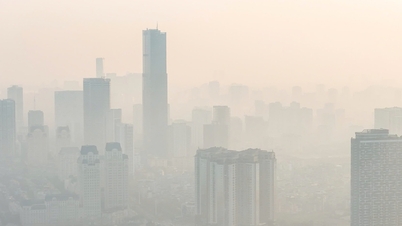It is forecasted that from January 6 to 8, 2025, the pollution level will reach a very bad level, causing serious harm to human health.
In recent days, air pollution in Hanoi and the northern provinces has been at an alarming level. In particular, from January 6 to 8, 2025, the pollution level is forecast to reach a very bad level, causing serious harm to human health.
 |
| According to the World Health Organization (WHO), air pollution is responsible for 7 million deaths each year globally. Illustrative photo |
The capital Hanoi, along with provinces such as Thai Nguyen, Vinh Phuc, Phu Tho, Hung Yen, Hai Duong and Thai Binh, continue to be severely affected by pollution. In some areas such as Thai Nguyen, Hung Yen and Thai Binh, the pollution index has reached the “very bad” level, causing serious harm to public health.
Based on data from air quality monitoring systems such as those of the Ministry of Natural Resources and Environment, the US Embassy and PAM Air, Hanoi recorded the highest pollution index on the morning of January 5, ranking third in the world, after Dhaka (Bangladesh) and Baghdad (Iraq).
The pollution level in this city even surpasses cities that are regularly severely polluted such as Delhi (India) and Karachi (Pakistan). What is worrying is that air pollution in Hanoi and surrounding areas can last for 3-4 days, with the peak on January 6 and 7.
Although the northeast monsoon may help reduce pollution around January 9-10, the risk of pollution recurring in the following days is still high. Prolonged pollution will seriously affect people's health, especially those with a history of cardiovascular and respiratory diseases, children, pregnant women and the elderly.
According to the World Health Organization (WHO), air pollution is responsible for 7 million deaths each year globally. In Vietnam, at least 70,000 people die each year from diseases related to air pollution, mainly respiratory diseases, cardiovascular diseases and lung cancer.
Air pollution is linked to serious health problems such as asthma, pneumonia, stroke, heart failure and lung cancer. Health experts say air pollution needs to be treated as a public health emergency, similar to the way we have treated the Covid-19 pandemic.
As Vietnam grapples with domestic air pollution, the threat of disease outbreaks from outside, especially China, cannot be ignored. The lung disease of unknown cause in China could be a warning of new epidemics or the resurgence of dangerous diseases.
Air pollution increases the risk of respiratory diseases, while disease outbreaks can have widespread public health impacts and easily spread across borders.
Additionally, environmental factors, such as pollution from gases and bacteria in the air, can create a favorable environment for viruses and bacteria to thrive, increasing the risk of disease.
To deal with concerns from air pollution and the risk of disease, speaking to reporters, according to Mr. Tran Dac Phu, former Director of the Department of Preventive Medicine, Vietnam's Ministry of Health, it is necessary to implement synchronous measures such as strengthening environmental pollution control.
The government needs to have strong policies to control and reduce air pollution. Measures such as developing public transport, controlling emissions from vehicles and industrial plants, and switching to clean energy need to be implemented quickly.
Vietnam needs to improve its health surveillance and disease forecasting system, especially for new diseases such as pneumonia of unknown cause. At the same time, it needs to implement preventive measures, monitor public health and strengthen international cooperation in disease control.
Provide information to the public on the risks of air pollution and how to protect their health, as well as the prevention and early detection of respiratory diseases. Protective measures such as wearing masks, using air purifiers, and limiting outdoor activities during pollution warnings should be widely disseminated.
Faced with serious air pollution, experts recommend that people take a number of measures to protect their personal and community health. First, when the air quality index (AQI) is at hazardous levels (201-300), people should minimize outdoor activities and strenuous exercise. They should do indoor activities or limit unnecessary travel.
For sensitive people such as children, pregnant women, the elderly and people with cardiovascular and respiratory diseases, direct exposure to polluted air should be avoided.
In addition, when going out, especially on heavily polluted days, people should wear anti-fine dust masks (PM2.5), which can prevent small, toxic dust particles from entering the body.
In addition to protecting yourself when going out, people need to pay attention to personal hygiene and living space. After going out, clean your nose and gargle with saline to remove dirt and pollutants.
In the house, you should regularly clean and ensure ventilation of the living space, limiting dust accumulation. Another important measure is to choose a reasonable means of transportation.
Use public transport instead of private vehicles to reduce exposure to air pollution. If you have to drive, reduce the time you spend outdoors. At the same time, limit the use of polluting stoves such as honeycomb coal stoves, firewood or straw burning, because these are sources of toxic smoke released into the air. Instead, use electric stoves or gas stoves.
In addition, improving nutrition to improve resistance is a necessary measure. Eating a balanced diet, supplementing with vitamin C and antioxidants will help the body increase resistance, minimizing the negative effects of air pollution.
People with chronic diseases, especially cardiovascular and respiratory diseases, need to comply with treatment as prescribed by their doctors and have regular health check-ups to monitor their condition.
When the air quality index is moderate (AQI 51-100), normal people can participate in outdoor activities, but sensitive people should limit strenuous outdoor activities and monitor their health.
When pollution levels are poor (AQI 101-150), people should reduce outdoor activities, especially activities that require high health. Sensitive people should avoid going outside, and if they do, they should minimize their exercise time.
If the pollution level reaches unhealthy levels (AQI 151-200), normal people should limit outdoor activities or participate in strenuous physical activities. Priority should be given to light indoor activities and limit going outside.
With very bad pollution levels (AQI 201-300), people should absolutely avoid outdoor activities or strenuous activities. It is recommended to stay indoors and use specialized masks when going out.
In particular, for children, the elderly and people with chronic diseases, strict health protection measures must be taken. When the air quality index reaches hazardous levels (AQI 301-500), normal people and sensitive people should absolutely avoid all outdoor activities, close windows and doors to limit exposure to polluted air.
Air pollution is a major public health hazard, and personal protective measures are essential in the current pollution situation. Monitoring air quality and taking proactive measures can help reduce the adverse health effects of pollution.




![[Photo] Prime Minister Pham Minh Chinh chairs meeting on science and technology development](https://vphoto.vietnam.vn/thumb/1200x675/vietnam/resource/IMAGE/2025/5/17/ae80dd74c384439789b12013c738a045)
![[Photo] Readers line up to visit the photo exhibition and receive a special publication commemorating the 135th birthday of President Ho Chi Minh at Nhan Dan Newspaper](https://vphoto.vietnam.vn/thumb/1200x675/vietnam/resource/IMAGE/2025/5/17/85b3197fc6bd43e6a9ee4db15101005b)

![[Photo] More than 17,000 candidates participate in the 2025 SPT Competency Assessment Test of Hanoi National University of Education](https://vphoto.vietnam.vn/thumb/1200x675/vietnam/resource/IMAGE/2025/5/17/e538d9a1636c407cbb211b314e6303fd)



























![[Photo] Nearly 3,000 students moved by stories about soldiers](https://vphoto.vietnam.vn/thumb/1200x675/vietnam/resource/IMAGE/2025/5/17/21da57c8241e42438b423eaa37215e0e)





































































Comment (0)